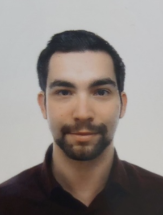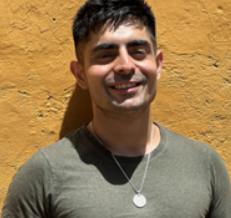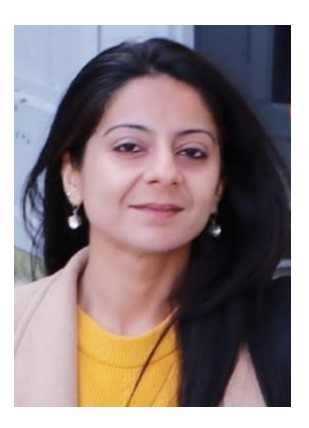Madan Research Lab
Research Lab of Dr. Esha Madan
Personal Statement
The Madan Lab is dedicated to redefining how we understand and treat cancer metastasis. Our research has revealed that cancer cells gain dominance by exploiting a hidden biological code- cellular fitness fingerprints encoded by the Flower gene. By forcing surrounding stromal cells into a vulnerable “Lose” state, aggressive tumors eliminate host tissue and create space for metastatic spread.
This discovery has driven two translational advances with direct clinical potential:
- Tu-Stroma, an exosomal long non-coding RNA secreted by tumor cells, serves as the earliest blood-detectable signal of pre-invasive ovarian cancer, including in premenopausal women where no current biomarker is effective.
- Aenya, a humanized monoclonal antibody targeting the Flower-Lose isoform, protects host stromal cells from cancer-induced elimination. Instead of attacking the tumor directly, Aenya defends healthy tissue, blocking metastatic niche formation and enhancing chemotherapy response.
By focusing on ovarian and pancreatic cancers - two of the deadliest and most recurrence-prone malignancies - our lab is pioneering a new paradigm of host-directed therapy and early detection. Our ultimate goal is to reduce the burden of metastatic relapse, preserve organ function, and deliver scalable solutions that transform patient survival.
Research Goals
-
Early Detection
Our lab is advancing Tu-Stroma, an exosomal long non-coding RNA secreted by ovarian tumor cells (Nature Biotech, 2024), as the first robust blood-based biomarker for detecting serous tubal intraepithelial carcinoma (STIC) and early high-grade serous carcinoma (HGSC). Unlike CA-125, HE4, or ultrasound, Tu-Stroma is secreted even by single-cell lesions and is detectable in circulation, including in premenopausal women where no existing tool works. Recent validation cohorts show AUC ~0.99, positioning Tu-Stroma as a transformative screening and triage tool.
-
Metastasis Therapy
We are pioneering Aenya, a humanized monoclonal antibody that binds Flower-Lose isoforms, shielding stromal cells from cancer-driven elimination. By protecting the host rather than attacking the tumor, Aenya blocks metastatic niche formation, preserves organ function, and amplifies chemotherapy efficacy. Preclinical ovarian and pancreatic cancer models (Nature Biotech, 2024) demonstrate both safety and powerful anti-metastatic activity, laying the foundation for first-in-class host-directed therapy in oncology.
-
Mechanism Discovery
At the heart of our program is the Flower Fitness Code - a molecular system that determines whether a cell survives or is eliminated. Our studies (Nature 2019; Cancer Research 2022; PNAS 2023) show that tumor cells hijack this code to reprogram stromal neighbors into a vulnerable “Lose” state, driving metastatic spread. Using single-cell transcriptomics, spatial biology, CRISPR/shRNA screens, and 3D patient-derived scaffolds, we are mapping the pathways of competitive elimination to identify novel therapeutic entry points.
-
Training Future Leaders
We are committed to cultivating the next generation of translational scientists. Trainees in our lab gain expertise in molecular oncology, patient-derived xenografts, biomarker assay development, antibody engineering, and computational biology. They also receive structured mentoring in grant writing, scientific communication, and interdisciplinary collaboration, preparing them for leadership roles in academia, biotech, and clinical research. Our track record includes training multiple PhD students and postdocs who are now publishing in Nature, Nat Biotech, PNAS, and EMBO Mol Med.
-
Collaboration Breakthroughs
Breakthroughs in fitness biology are only possible through global collaboration. We partner with leaders across oncology, genomics, immunology, and computational biology - including investigators at Harvard, UPenn, Johns Hopkins, Indiana University, Nottingham, Basel, Aarhus, and Peter MacCallum. This network enables access to international patient cohorts, advanced statistical modeling, and clinical trial consortia, ensuring that our discoveries move rapidly from bench to bedside.
Research Focus
Cancer progression is not only driven by mutations but by competition for tissue fitness. Our lab studies how tumor cells actively weaken and replace surrounding stromal cells, a process that fuels both stealthy early growth and lethal metastatic relapse.
-
Fitness Fingerprints
Cancer cells don’t just out-divide neighbors - they broadcast “fitness fingerprints” via Flower isoforms (Win vs. Lose) to identify which surrounding cells should live or be eliminated. In human tumors, high Flower-Win on cancer cells combined with Flower-Lose on adjacent tissue accelerates growth and spread; knocking down Flower curbs tumor growth, migration/metastasis, and increases chemo sensitivity in vivo. Mechanistically, this reframes malignancy as fitness-based selection layered on top of mutations. Key syntheses further position Flower (with Myc, Hippo, p53 axes) as part of a broader competitive program that cancers hijack (Nature, 2019).
-
Tumor–Stroma Interactions
Metastasis is enabled not only by tumor-intrinsic changes but by active downgrading of stromal fitness. In ovarian cancer, recent work shows tumor cells induce a Flower-Lose state in microenvironmental cells (not merely pre-existing), creating space and support for expansion - direct evidence that tumors reshape host tissue competitiveness to gain dominance (Nature Biotech, 2024). Concept and mechanism align with comprehensive reviews of intratumoral and tumor–stroma competition (EMBO, 2021), and new neighbor-aware omics (e.g., PIC-seq) that capture contact-specific signaling underlying niche takeover.
-
Flower Antibody Therapy (Aenya)
Our therapeutic strategy flips the script from “kill the tumor” to “protect the host.” By blocking Flower-Lose–mediated stromal elimination, Aenya aims to preserve tissue fitness, prevent metastatic niche formation, and improve chemo response. This approach is mechanistically grounded in human Flower biology where knockdown or inhibition of Flower-Lose reduces tumor growth and metastasis while improving chemotherapy outcomes (Nature, 2019; Nature Biotech, 2024).
-
Biomarker Discovery (Exosome-Based)
Building on fitness biology, our biomarker program translates tumor–stroma crosstalk into circulating readouts, focusing on tumor-secreted extracellular vesicles (EVs). Across high-impact reviews and clinical studies, EV cargo (RNAs/proteins) is a robust, non-invasive liquid biopsy modality for ovarian cancer- supporting early detection, prognosis, and therapy monitoring, and capturing microenvironmental reprogramming signals missed by cell-free DNA alone. State-of-the-art reviews in BJC, Molecular Cancer, Trends in Cancer, and EBioMedicine outline EV assay considerations, clinical momentum, and pitfalls-context that aligns with our exosome-RNA diagnostic development.
Our laboratory integrates molecular biology, spatial biology, single-cell transcriptomics, 3D tumor scaffolds, and patient-derived xenografts, ensuring that discoveries move seamlessly from bench to bedside.
Mentor Statement
At our lab, mentoring and training is core to our principles and values. We strongly believe in pushing the boundaries of existing knowledge and being comfortable with the uncharted territories of research. Our focus is on translational research from bench side to bedside. In the lab, we train the students for a wholistic approach to research, including hypothesis testing, being innovative in their approach to problem solving, data analysis, improving presentation & communication skills as well as training them to write grants for fund raising. We strongly believe in collaborations and interdisciplinary research. The trainees are encouraged to participate in departmental and institutional meetings where they would present their work. In addition, students are encouraged to present their findings in conferences through oral and/ or poster presentations. A cornerstone of our lab is to publish our scientific findings in academic journals for dissemination of such knowledge to the wider scientific community. I have trained several undergraduates, medical students, PhD and MS students and post-doctoral fellows at the lab.
Lab Members
Dr. Antonio Palma, Ph.D.

My research focus has been in the field of cancer biology with a particular interest in transcriptional mechanisms, cell signaling, and cell competition. My prior training includes a Bachelor's in Medical Laboratory Sciences (2015), a Master's in Oncobiology (2019), and a PhD in Biotechnology and Biosciences (2023). Since 2016, my main goal is to study cancer biology from a translational perspective, which aims to bring basic science research findings from the bench to clinics. This can be achieved by using human patient samples to describe cancer models, which can later be used to discover new early detection and prognosis biomarkers and to find new therapeutic targets that will improve cancer treatment. In 2019, I joined Dr Madan and Dr Gogna's team and collaborated on the publications at multiple high-impact journals such as Nature, PNAS, NAR, Cancer Research, EMBO Mol Med, and EMBO Journal. Among th
em, I highlight the discovery of fitness fingerprints and cell competition mechanisms in the promotion of tumor growth, published in Nature (2019), which regulatory mechanisms were further elucidated during my PhD training. My scientific contributions are not limited to cancer biology. Together with Dr Madan, I published a study that discovered Flower Lose as a prognostic marker for COVID-19 outcomes. Additionally, I have a publication on embryonic development that applies artificial intelligence and machine learning tools to describe how cell-cell interactions affect the transcriptome in a cell-type-specific manner. In the future, I intend to continue studying cell competition and cellular microenvironments in different diseases, thus finding potential biomarkers and therapeutic targets that will improve patients' health and secure continuous publications in high-impact journals.
- Palma AM, Bushnell GG, Wicha MS, Gogna R. Tumor Microenvironment interactions with cancer stem cells in pancreatic ductal adenocarcinoma. Advances in Cancer Research. Forthcoming; 159. Available from: https://www.elsevier.com/books/pancreatic-cancer-basic-mechanisms-and-therapies/emdad/978-0-443-13354-1 First Author
- Palma AM, Peixoto MLeonor, Vudatha V, Madan E. Tumor heterogeneity: an oncogenic driver of PDAC progression and therapy resistance under stress conditions. Advances in Cancer Research. Forthcoming; 159.Available from: https://www.elsevier.com/books/pancreatic-cancer-basic-mechanisms-and-therapies/emdad/978-0-443-13354-1 First Author
- KimJ, Rothová M, Madan E, Rhee S, Weng G, Palma A, Liao L, David E, Amit I,Hajkarim M, Vudatha V, Gutiérrez-García A, Moreno E, Winn R, Trevino J, FisherP, Brickman J, Gogna R, Won K. Neighbor-specific gene expression revealed from physically interacting cells during mouse embryonic development. Proceedings oft he National Academy of Sciences. 2023 January 03; 120(2):-.Available from: https://pnas.org/doi/10.1073/pnas.2205371120 DOI:10.1073/pnas.2205371120
- Madan E, Palma AM, Vudatha V, Trevino JG, Natarajan KN,Winn RA, Won KJ, Graham TA, Drapkin R, McDonald SAC, Fisher PB, Gogna R. CellCompetition in Carcinogenesis. Cancer Res. 2022 Dec 16;82(24):4487-4496. PubMedCentral PMCID: PMC9976200. Shared First Author
- Madan E,Parker TM, Pelham CJ, Palma AM, Peixoto ML, Nagane M, Chandaria A, Tomás AR,Canas-Marques R, Henriques V, Galzerano A, Cabral-Teixeira J, Selvendiran K,Kuppusamy P, Carvalho C, Beltran A, Moreno E, Pati UK, Gogna R. HIF-transcribedp53 chaperones HIF-1α. NucleicAcids Res. 2019 Nov 4;47(19):10212-10234. PubMed Central PMCID: PMC6821315.
- Madan E, Pelham CJ, Nagane M, Parker TM, Canas-MarquesR, Fazio K, Shaik K, Yuan Y, Henriques V, Galzerano A, Yamashita T, Pinto MAF,Palma AM, Camacho D, Vieira A, Soldini D, Nakshatri H, Post SR, Rhiner C,Yamashita H, Accardi D, Hansen LA, Carvalho C, Beltran AL, Kuppusamy P, GognaR, Moreno E. Flower isoforms promote competitive growth in cancer. Nature.2019 Aug;572(7768):260-264. PubMed PMID: 31341286
Anaya Surve
 My name is Anaya Surve and I am a bioinformatics major on the pre-med track. When I am not in the lab or helping edit papers, I am volunteering at ASK Childhood Cancer Foundation, tutoring at the Campus Learning Center, or playing cards with my brother. I value the importance of research in driving medicine forward and am very grateful and excited to be part of that process
My name is Anaya Surve and I am a bioinformatics major on the pre-med track. When I am not in the lab or helping edit papers, I am volunteering at ASK Childhood Cancer Foundation, tutoring at the Campus Learning Center, or playing cards with my brother. I value the importance of research in driving medicine forward and am very grateful and excited to be part of that process
Dr. Sahil Chaudhary, M.B.B.S. – Research Assistant
 Translational medicine is the bridge that connects basic sciences research to the bedside clinical application. My interest in cellular and molecular biology, motivated me to pursue an engineering degree in Biotechnology. During my engineering, I understood the complex cell signaling pathways, and the technology of genetic engineering in curing diseases and that drew my attention towards oncology. After understanding biology at a cellular & molecular level during my undergrad, I wanted to understand the complex human body as well as their diseases and their management; this nudged me in the direction of medical school. My training as a medical doctor helped me understand not only the clinical presentation of a diseases and their management but also the importance of translational medicine in the clinical setting. During the Covid-19 pandemic, while working as a junior doctor in emergency medicine, I worked with Dr. Gogna & Dr. Madan and contributed in identifying one cell fitness marker called “Flower” in Covid-19 patients. In Dr. Madan’s lab, I will use my medical training and experience in clinical pathology to understand the basic science mechanisms of competitive cell interactions and their impact on a wide array of diseases. I will bring in translational knowledge to develop monoclonal antibody therapies to leverage the basic science mechanisms discovered in the lab. Outside the lab, I am a fitness enthusiast and excited about adventure sports. On lazy days, I like to spend my time playing open-world games on PlayStation.
Translational medicine is the bridge that connects basic sciences research to the bedside clinical application. My interest in cellular and molecular biology, motivated me to pursue an engineering degree in Biotechnology. During my engineering, I understood the complex cell signaling pathways, and the technology of genetic engineering in curing diseases and that drew my attention towards oncology. After understanding biology at a cellular & molecular level during my undergrad, I wanted to understand the complex human body as well as their diseases and their management; this nudged me in the direction of medical school. My training as a medical doctor helped me understand not only the clinical presentation of a diseases and their management but also the importance of translational medicine in the clinical setting. During the Covid-19 pandemic, while working as a junior doctor in emergency medicine, I worked with Dr. Gogna & Dr. Madan and contributed in identifying one cell fitness marker called “Flower” in Covid-19 patients. In Dr. Madan’s lab, I will use my medical training and experience in clinical pathology to understand the basic science mechanisms of competitive cell interactions and their impact on a wide array of diseases. I will bring in translational knowledge to develop monoclonal antibody therapies to leverage the basic science mechanisms discovered in the lab. Outside the lab, I am a fitness enthusiast and excited about adventure sports. On lazy days, I like to spend my time playing open-world games on PlayStation.
Affiliated Lab Members
Dr. Praveen Bhoopathi, Ph.D.
 Leveraging my background in cancer biology, I have conducted extensive research aimed at understanding the molecular basis of various types of cancer, including neuroblastoma, glioblastoma, pancreatic cancer, prostate cancer, and glioma. My research endeavors encompass a wide range of topics within cancer biology, with a particular focus on studying the mechanisms underlying cancer progression, metastasis, and the development of effective therapies.
Leveraging my background in cancer biology, I have conducted extensive research aimed at understanding the molecular basis of various types of cancer, including neuroblastoma, glioblastoma, pancreatic cancer, prostate cancer, and glioma. My research endeavors encompass a wide range of topics within cancer biology, with a particular focus on studying the mechanisms underlying cancer progression, metastasis, and the development of effective therapies.
In the realm of gene therapy, I have explored its potential application as a therapeutic approach for these different types of cancer. By investigating the interactions between genetic alterations, signaling pathways, and cellular processes, I aim to uncover new insights into the biology of these cancers and identify potential targets for therapeutic intervention.
Through my efforts, I have contributed to the scientific community with approximately 50 peer-reviewed publications published in prestigious journals such as PNAS, Cancer Research, and Cell Death and Differentiation. These publications have highlighted the significance of gene therapy in preventing metastasis, inducing tumor regression, and advancing our understanding of cancer.
By expanding our knowledge of the molecular mechanisms underlying these cancers, I strive to contribute to the development of innovative and effective treatment strategies that can ultimately improve patient outcomes in the field of cancer biology.
Dr. Amit Kumar, Ph.D.
My academic training and research experience have provided me with an excellent background in multiple biological disciplines including molecular biology, microbiology, cell biology, and microscopy. In my early career I studied host-pathogen interactions and molecular pathogenesis, intracellular signaling, and cytotoxicity. In my work, during graduate and as a postdoctoral fellow, I have applied traditional and innovative cell biology, transcriptomic and flow cytometric approaches to study KSHV reactivation and EBV mechanisms of genomic instability in nasopharyngeal carcinoma and got expertise in live cell imaging and genomic instability. The postdoctoral research at JHMI provided me with new conceptual and technical training in stem cell biology and genome editing. I had been conducting research to develop a hiPSC- derived HSPC-based therapy as a curative alternative to the expensive non-curative GCase enzyme replacement therapy (ERT) to treat Gaucher's Disease (GD). Parallelly at Johns Hopkins I explored and understand the complexities of cancer immunotherapy and cell-cell interactions, I used immunotoxin (DAB-IL2) directed to deplete Tregs from the tumor microenvironment in different established preclinical tumor models and found that Tregs depletion from tumor microenvironment resulted in the antitumor effect and enhanced immune functions. Currently I am working as a postdoctoral fellow at VCU to define the molecular basis of cancer development and progression to metastasis. In the future, I am planning to continue research on the interactions between cells and the cellular microenvironments in various diseases in order to identify possible biomarkers and therapeutic targets that will enhance patient health.
Anza Sardar
 As a Biology major with a minor in Political Science at VCU, I am dedicated to pursuing a Bachelors in the pre-medical track followed by a degree as Doctor in Medicine. Throughout my introductory and advanced coursework, my passion for science has flourished, driving me to seek independent research opportunities as an undergraduate student. My specific interests lie in molecular and cellular biology as well as genetics. My recent research focus has been on the correlation between dopamine activity ratio, measured by radiolabella (L-dopa) and positron emission tomography (PET), and the potential increase in presynaptic striatal dopaminergic function in schizophrenic patients. By exploring the influence of risk factors such as trauma, drug use, and genetics, I aim to shed light on this complex relationship. Currently (2023), I had the privilege of joining the esteemed team led by Dr. Gogna and Dr. Madan. As part of this collaborative effort, we embark on groundbreaking research projects that result in the publication of our work in multiple high-impact journals. Moving forward, my academic and research pursuits will be focused on studying the intricate topics of molecular and cellular biology, with a specific emphasis on genetics as it relates to various diseases. I aspire to uncover key molecular pathways, genetic variations, and bimolecular signatures that can serve as diagnostic tools and guide the development of targeted therapies that have the potential to enhance patients' health and well-being.
As a Biology major with a minor in Political Science at VCU, I am dedicated to pursuing a Bachelors in the pre-medical track followed by a degree as Doctor in Medicine. Throughout my introductory and advanced coursework, my passion for science has flourished, driving me to seek independent research opportunities as an undergraduate student. My specific interests lie in molecular and cellular biology as well as genetics. My recent research focus has been on the correlation between dopamine activity ratio, measured by radiolabella (L-dopa) and positron emission tomography (PET), and the potential increase in presynaptic striatal dopaminergic function in schizophrenic patients. By exploring the influence of risk factors such as trauma, drug use, and genetics, I aim to shed light on this complex relationship. Currently (2023), I had the privilege of joining the esteemed team led by Dr. Gogna and Dr. Madan. As part of this collaborative effort, we embark on groundbreaking research projects that result in the publication of our work in multiple high-impact journals. Moving forward, my academic and research pursuits will be focused on studying the intricate topics of molecular and cellular biology, with a specific emphasis on genetics as it relates to various diseases. I aspire to uncover key molecular pathways, genetic variations, and bimolecular signatures that can serve as diagnostic tools and guide the development of targeted therapies that have the potential to enhance patients' health and well-being.
Dr. Kartik Gupta, Ph.D
 I obtained my Ph.D. in cell and molecular biology at the University of Wisconsin-- Madison where I investigated the role of cell death in cancer and cardiovascular biology. I investigated the role of post-translational modifications on key cell death proteins in the regulation of cell-death and identified a novel pathway of exosome secretion in the context of cell death. I have been a part of Dr. Esha Madan and Dr. Rajan Gogna's group for 10+ years and have contributed to several discoveries in their team related to cell competition and oxygen-signaling. After my Ph.D., I was a post-doc at Merck and Co., and am currently a scientist in immuno-oncology at a Bay Area startup. In my free time I am passionate about weightlifting, running, and watching TV shows.
I obtained my Ph.D. in cell and molecular biology at the University of Wisconsin-- Madison where I investigated the role of cell death in cancer and cardiovascular biology. I investigated the role of post-translational modifications on key cell death proteins in the regulation of cell-death and identified a novel pathway of exosome secretion in the context of cell death. I have been a part of Dr. Esha Madan and Dr. Rajan Gogna's group for 10+ years and have contributed to several discoveries in their team related to cell competition and oxygen-signaling. After my Ph.D., I was a post-doc at Merck and Co., and am currently a scientist in immuno-oncology at a Bay Area startup. In my free time I am passionate about weightlifting, running, and watching TV shows.
Maria Leonor Peixoto
 In 2019 I was fortunate enough to be committed to research work concerning tumors and their microenvironment- I have studied the alternative splicing that generates the Win and Lose Flower isoforms (Madan E. et al., Nature 2019). I eventually completed the integrated MSc in Biological Engineering from the Instituto Superior Tecnico (Lisbon) and continued my scientific career as a Ph.D. Student of Biotechnology and Biosciences. My training and expertise achieved during the last four years under the supervision of Dr. Esha Madan are in the field of molecular oncology and deal with the role of transcription factors in cancer growth and metastasis. My work was translated into publications and reviews in high-impact journals such as NAR and Trends Cell Biology. I aim to continue performing cutting-edge research and bring innovative and newly identified biomarkers for the early diagnosis and development of anti-cancer therapies from the bench to the bedside.
In 2019 I was fortunate enough to be committed to research work concerning tumors and their microenvironment- I have studied the alternative splicing that generates the Win and Lose Flower isoforms (Madan E. et al., Nature 2019). I eventually completed the integrated MSc in Biological Engineering from the Instituto Superior Tecnico (Lisbon) and continued my scientific career as a Ph.D. Student of Biotechnology and Biosciences. My training and expertise achieved during the last four years under the supervision of Dr. Esha Madan are in the field of molecular oncology and deal with the role of transcription factors in cancer growth and metastasis. My work was translated into publications and reviews in high-impact journals such as NAR and Trends Cell Biology. I aim to continue performing cutting-edge research and bring innovative and newly identified biomarkers for the early diagnosis and development of anti-cancer therapies from the bench to the bedside.
- Palma AM, Peixoto Maria Leonor, Vudatha V, Madan E. Tumor heterogeneity: an oncogenic driver of PDAC progression and therapy resistance under stress conditions. Advances in Cancer Research, 159 (2023);
- Esha Madan, Maria Leonor Peixoto, Peter Dimitrion, Timothy D. Eubank, Michail Yekelchyk, Sarmistha Talukdar, Paul B. Fisher, Qing-Sheng Mi, Eduardo Moreno, Rajan Gogna Cell Competition Boosts Clonal Evolution and Hypoxic Selection in Cancer. Trends in Cell Biology, 30, 12, 967-978 (2020);
- Camacho D, Jesus JP, Palma AM, Martins SA, Afonso A, Peixoto Maria Leonor, Pelham CJ, Moreno E, Gogna R., SPARC-p53: The double agents of cancer. Advances in Cancer Research, 148:171-199 (2020);
- Pelham C, Parker TM, Nagane M, Beltran A, Carvalho C, Selvendiran K, Pati U, Maria Leonor Peixoto, Gogna R., HIF-transcribed p53 chaperones HIF-1α in an oncogenic feed-back loop. Nucleic Acid Research, 47, 19, 10212–10234 (2019).
Selected Peer-Reviewed Publications
- Kim J, Rothová MM, Madan E, Rhee S, Weng G, Palma AM, Liao L, David E, Amit I, Hajkarim MC, Vudatha V, Gutiérrez-García A, Moreno E, Winn R, Trevino J, Fisher PB, Brickman JM, Gogna R, Won KJ. Neighbor-specific gene expression revealed from physically interacting cells during mouse embryonic development. Proc Natl Acad Sci U S A. 2023 Jan 10;120(2):e2205371120. doi: 10.1073/pnas.2205371120. Epub 2023 Jan 3. PMID: 36595695; PMCID: PMC9926237. https://doi.org/10.1073/pnas.2205371120
- Madan E, Pelham CJ, Nagane M, Parker TM, Canas-Marques R, Fazio K, Shaik K, Yuan Y, Henriques V, Galzerano A, Yamashita T, Pinto MAF, Palma AM, Camacho D, Vieira A, Soldini D, Nakshatri H, Post SR, Rhiner C, Yamashita H, Accardi D, Hansen LA, Carvalho C, Beltran AL, Kuppusamy P, Gogna R, Moreno E. Flower isoforms promote competitive growth in cancer. Nature. 2019 Aug;572(7768):260-264. doi: 10.1038/s41586-019-1429-3. Epub 2019 Jul 24. PubMed PMID: 31341286. https://www.nature.com/articles/s41586-019-1429-3
- Madan E, Palma AM, Vudatha V, Trevino JG, Natarajan KN, Winn RA, Won KJ, Graham TA, Drapkin R, McDonald SAC, Fisher PB, Gogna R. Cell Competition in Carcinogenesis. Cancer Res. 2022 Dec 16;82(24):4487-4496. doi: 10.1158/0008-5472.CAN-22-2217. PMID: 36214625; PMCID: PMC9976200. https://doi.org/10.1158/0008-5472.CAN-22-2217
- Yekelchyk M, Madan E, Wilhelm J, Short KR, Palma AM, Liao L, Camacho D, Nkadori E, Winters MT, Rice ES, Rolim I, Cruz-Duarte R, Pelham CJ, Nagane M, Gupta K, Chaudhary S, Braun T, Pillappa R, Parker MS, Menter T, Matter M, Haslbauer JD, Tolnay M, Galior KD, Matkwoskyj KA, McGregor SM, Muller LK, Rakha EA, Lopez-Beltran A, Drapkin R, Ackermann M, Fisher PB, Grossman SR, Godwin AK, Kulasinghe A, Martinez I, Marsh CB, Tang B, Wicha MS, Won KJ, Tzankov A, Moreno E, Gogna R. Flower lose, a cell fitness marker, predicts COVID-19 prognosis. EMBO Mol Med. 2021 Nov 8;13(11):e13714. doi: 10.15252/emmm.202013714. Epub 2021 Oct 18. PMID: 34661368; PMCID: PMC8573598. https://www.embopress.org/doi/full/10.15252/emmm.202013714
- Parker TM, Gupta K, Palma AM, Yekelchyk M, Fisher PB, Grossman SR, Won KJ, Madan E, Moreno E, Gogna R. Cell competition in intratumoral and tumor microenvironment interactions. EMBO J. 2021 Sep 1;40(17):e107271. doi: 10.15252/embj.2020107271. Epub 2021 Aug 9. PMID: 34368984; PMCID: PMC8408594. https://doi.org/10.15252/embj.2020107271
Complete list of published work in My Bibliography: https://www.ncbi.nlm.nih.gov/myncbi/1pc9Ct9N0rzQh/bibliography/public/
